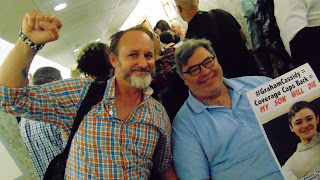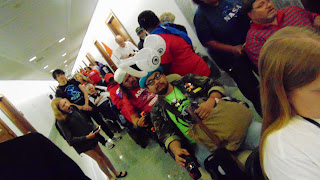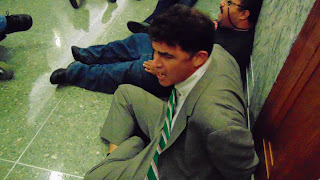Washington,
DC—After the GOP’s latest failure to muster enough votes to
repeal the Affordable Care Act (ACA), a national network of
“birddoggers” celebrated the preservation of access to
healthcare for more than 30 million Americans. The network of
patients, health workers, faith leaders and people with
disabilities span 42 states, Puerto Rico and the District of
Columbia, and is supported by Housing Works, and the Center
for Popular Democracy. Since the beginning of the year,
independent groups from more than 60 cities have linked up to
save health care, prioritizing making demands of elected
officials in-person, and has been willing to escalate until
the job is done. These thousands of birddoggers packed
townhalls, held thousands of lobby meetings, and, by the July
4th Recess, began a series of rapidly escalating occupations
of Senate offices, including a single day takeover of 49
Senate Republican offices on July 19 who had yet to oppose
ACA repeal, a disruption of the Senate’s motion to proceed
vote, and, finally, a massive crowd that temporarily seized
control of the Senate Finance Committee’s hearing on the
Graham-Cassidy repeal bill.
The
activists are pivoting now to advance a bipartisan package
of immediate fixes, similar to those debated during this
month's hearings in the Senate HELP Committee. Birdoggers
are pushing hard for rapid action to stabilize marketplaces,
bring down insurance rates, and continue Medicaid expansion,
on the road towards universal healthcare. “Shameful efforts
to take from the sick to give to the rich have unleashed an
unstoppable force in America,” said Jaron Benjamin from
Housing Works in New York. “We came from every corner of the
country to stop them, taking over their offices, stopping
their votes, and disrupting their sham hearings. We won’t
stop until everyone in this country has affordable,
high-quality healthcare.”
The
bill’s final demise took place at Monday’s hastily organized
Senate committee hearing, which was disrupted by throngs of
protesters whose numbers approached 1,000. At the very front
of the line, having waited since dawn, were hundreds of
disabled individuals from ADAPT and hundreds more from the
birddogger network. Fewer than 20 people from the general
public were allowed into the Senate hearing room. Even so,
the hearing was interrupted from the outset by the small group
that did manage to get in, “No cuts to Medicaid. Save our
liberty!” This chant immediately triggered simultaneous
protests by the masses locked outside the hearing room. Their
chants of “Kill the bill, don’t kill us!” rocked the entire
building, and it took more than three hours to arrest and
remove all of them. Collectively, Monday’s protests resulted
in 181 arrests.
With
the bill’s failure, Republicans have lost their last best
chance to repeal ACA, marking the end of an immediate threat
to the health law, and dealing yet another blow to the Trump
Administration’s agenda. Tuesday’s victory is the latest in a
series of healthcare activist wins to protect ACA. The GOP has
attempted to ram through various versions of TrumpCare since
early spring, but has failed in the face of steep opposition
from constituents in every state. With this win,
the activists are now pushing hard for Congress to
quickly pass a package of bipartisan fixes to the ACA,
urging members of the Senate HELP Committee to introduce a
bill in the coming week, as well as supporting renewed
funding for the Children’s Health Insurance Program (CHIP) and
community health centers--vital programs which expire soon.
“This
has been another amazing and sweet victory for people power,”
said Housing Works
CEO and co-founder Charles King.
“By working
together, we have sent a clear message that ACA repeal is a
matter of life or death for the tens of millions of Americans
who would lose coverage, especially for those with
pre-existing conditions like HIV. We have put our bodies on
the line again and again to show that playing cruel partisan
politics with people’s lives will not stand. This latest
victory is a major win, and now we’re going to go on the
offensive to quickly get a bill to stop the sabotage and
correct the flaws in the ACA. We will keep at it to protect
and improve affordable care in the U.S. until everyone has
the healthcare they need.”
Participation
in this kind of campaign was a first for most of the hundreds
of birddoggers who made their way to Washington. Before this
year, many never contacted their representatives, been to the
Capitol, or been involved in activism, much less risked
arrest. And many showed up for this fight not only because it
was right, but because it was personal and potentially fatal:
“I'm
just a mom. I did what any parent would do,” said Rebecca
Wood of Charlottesville, Virginia. Wood’s five-year-old
daughter Charlie has battled lifelong, chronic health
complications due to her severely premature birth; her ongoing
survival depends on expensive medical care. Never
before politically active, since January, Wood has joined ‘The
Little Lobbyists’ group of families, and attended 42
protests, lobbied countless hours, met members of Congress,
participated in actions in seven cities, and been arrested
twice. “Charlie has come so far,” Wood said, “and it’s
because of the services that insurance coverage and her
Medicaid waiver have made possible. With the ACA, she now has
a very good chance at a typical adulthood. Without it, she’s
sentenced to a lifetime of unnecessary disability.”
“Last
week in Kansas, I told Senator Moran to his face that I had a
pre-existing condition and that Graham-Cassidy could kill me,
yet he refused to condemn the bill,” said Kansas State
University student Kennedy Hackerott. “This week, I came
to D.C. to protect my own life and when I saw Senator Moran
again, this time I was in handcuffs. He didn't acknowledge me
when I called out to him as he walked by.”
For
others, the heathcare fight has been about caring for their patients:
“
If
the Senators who were ready to support Graham-Cassidy had to
answer to patients the way doctors and nurses do,” said Dr.
Roona Ray, a board member of Physicians for a National
Health Program, “they would have been too ashamed to
even consider throwing millions of sick and disabled
people—among our most vulnerable Americans—off of healthcare.”
“I
didn’t realize when I stood up to Senator [Bill] Cassidy
during a public even here this month, that I was only one in a
long line of people he has lied to,” said Dr. Wendy
Johnson of Santa Fe, New Mexico. “After this defeat, he
better get that message. As a working physician, Dr. Cassidy’s
support for this malicious bill is a profound insult. The
medical community has made it clear that we will not stand
for it.”
Alice
Riener, Chief Legal & Policy Officer at CrescentCare, a
New Orleans health center serving low-income people, said,
“We
are relieved that Congress prioritized the health of over
400,000 Louisianans on Medicaid as well as more than one
million people with pre-existing conditions, who have all
benefited tremendously from the ACA. We look forward to
Congress focusing on shoring up the health insurance
marketplace exchanges.”
Many
protesters voiced that the elected officials who intended to
vote to pass Graham-Cassidy will face dire consequences.
“When
Republican Senators like Luther Strange align themselves
against people with disabilities and chronic conditions, and
threaten our most vulnerable children, they lose. Senator
Strange wasn't offering anything to the people of Alabama
except less money for sick children, fewer protections for a
seniors, and higher out-of-pocket costs. Healthcare affects
everyone, and Strange was indistinguishable from his
opponent. He lost the moderates who decide elections, and
other candidates for office should take heed,” said Matthew
Myrick, a parent of a child with cystic fibrosis from Alabama.
“We
will beat these attacks on affordable care back every time,
and come election time, we will hold the slews of vulnerable
GOP House members in Pennsylvania responsible for the actions
of their party at the polls,” said Philadelphia resident
Jose DeMarco, a leader of ACT UP who is living with
HIV. “Even those who voted against the AHCA are going to
pay for their party’s crass effort to hurt poor and working
people, the elderly and the sick in Pennsylvania. No wonder
moderates are resigning already.”
“The
majority of Americans do not want the ACA repealed, and even
more have been against the recent replacement
attempts,” said Dr. Kevin Burns of Tucson,
Arizona. “It’s astounding that Senator Flake, who won his
seat by a narrow margin, supported a bill that would have
resulted in half a million of his constituents losing
coverage. He’ll lose re-election to a pet rock next time.”
Despite
Tuesday’s victory, the campaign to achieve universal
affordable care for all is far from over. The Trump
Administration continues to try to force the collapse of the
ACA on multiple fronts. In spite of claims of support for
devolving power to state, Secretary Price has recently been
denying state waiver requests to use funds from reinsurance
pools to bring down their own rates, while making it as
difficult as possible for those in need of health care to
enroll. Advocates are keeping the campaign’s momentum going by
pushing for rapid action on a bipartisan bill from Senate HELP
Committee Chair Lamar Alexander (R-TN) and Ranking Member
Patty Murray (D-WA). Activists want a bill that funds
subsidies needed to stabilize the market and bring down rates,
provides federal government funds for state reinsurance
programs, and allows people the opportunity to buy in to the
Federal Employees Insurance Program. In exchange, states
could be granted reasonable flexibility in their ACA waiver
applications--as long as ACA benefits and “guardrails” are
protected.
In
light of the looming threat of willful ACA sabotage, as soon
as Kennedy Hackerott and his KSU classmate Garrett Wilkinson
were released by Capitol police, they returned to Senator
Jerry Moran's office. “We urged the Senator and his staff to
protect the lives of disabled people and others in need, and
to move forward in a bipartisan manner, starting with funding
the cost-sharing reduction subsidies that will keep premiums
down for his constituents,” said Wilkinson.
So
even as they celebrate this week, advocates are already
looking to the future, asserting that they are ready to
continue their fight for healthcare relentlessly and
persistently, whatever comes, just as they have throughout 2017.
“Thanks
to the GOP, I now have a nationwide family,” said Katrina
Raser, a member of Tuesdays with Toomey, a Pennsylvania
citizen advocacy group. “To the Republicans who plan to
keep attacking us, look out—because we will respond
relentlessly with fierce determination if you come for any one
of us.”
“Now
is the time for Congress to work together for solutions to fix
healthcare, not break it,” said Burns. “Senator
Alexander, who heads up the Senate health committee, should
immediately push forward on legislation to fund cost-sharing
discounts that will lower premiums, which has broad bipartisan support.”
“I
risked deportation because we are at a crossroads in
history,” said Illinois resident Eglė Malinauskaitė, a
self-identified queer undocumented immigrant living with
PTSD. “Millions of people nationwide, documented and
undocumented, know that it's time for Medicare for all, the
only system that would go beyond incremental fixes and
guarantee healthcare as a right. The question electeds must
answer now: Will you stand as leaders with the people or will
you risk your jobs by standing up for profit?”
Musing
about the lessons of this past year
,
Air
Force veteran and teacher
G
wendolynn
Combs noted that she is now a Congressional Candidate for
Arkansas's Second District:
“The
beauty of solidarity is that when we truly engage together, we
have the power of numbers. I called Senators for months on
end, I demonstrated in my local offices, and even traveled to
D.C. repeatedly to let my Senators know their jobs would be in
jeopardy if they didn't put people before party. On July 28,
when both Arkansas' senators voted to repeal ACA without a
replacement, I decided I needed to do even more to defend
access to quality healthcare. That is the day I filed with the
FEC to run for Congress.”
--
* The 400+
arrestees cited here are individuals affiliated with
independent local groups across the country that were trained
and mobilized in an effort led by Housing Works or the Center
for Popular Democracy, who were joined by a half dozen other
allied organizations. This number
does not include the hundreds of additional
arrests sustained by the disabilities rights group ADAPT. All
three groups worked and sometimes collaborated to save the
ACA, but ADAPT’s actions were theirs alone. Housing Works and
CPD are proud to be counted among ADAPT’s supporters.


































































































































